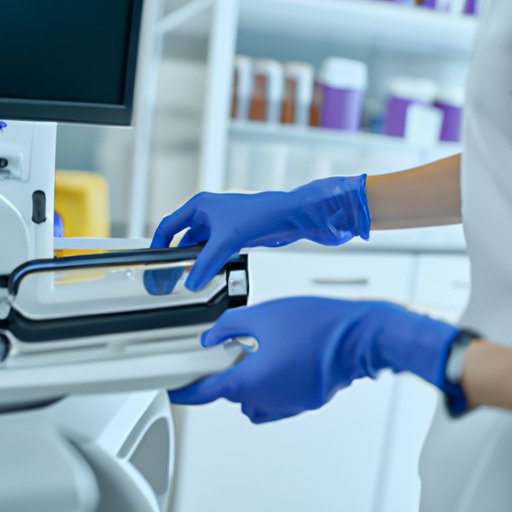Introduction
Medical laboratory technology (MLT) is an important part of modern healthcare. It involves the use of specialized equipment and processes to analyze samples taken from patients in order to diagnose, treat, and prevent illnesses. Medical laboratory technologists are highly trained professionals who are responsible for collecting, processing, and analyzing specimens obtained from patients. In this article, we will explore what medical laboratory technology is and the role of medical laboratory technicians in healthcare. We will also take an inside look at a day in the life of a medical laboratory technician and examine the types of tests performed by these professionals.
Exploring the Role of Medical Laboratory Technicians in Healthcare
Medical laboratory technicians play a vital role in the healthcare system. They are responsible for collecting, processing, and analyzing specimens obtained from patients. For example, they may collect blood or urine samples, prepare them for analysis, and then use specialized equipment to analyze the samples. The results of these analyses can help doctors diagnose and treat illnesses more effectively. According to the American Society of Clinical Pathology, “Medical laboratory technologists are the frontline of patient care. Their work helps physicians diagnose, monitor, and treat disease.”
In addition to helping diagnose and treat illnesses, medical laboratory technicians also have other responsibilities. For instance, they may be responsible for maintaining laboratory equipment, keeping accurate records, and preparing reports for doctors and other healthcare professionals. Furthermore, they may provide education and training to other healthcare professionals on how to use laboratory equipment and interpret test results.
The benefits of medical laboratory technology for both patients and healthcare providers are numerous. By utilizing medical laboratory technology, healthcare providers can make faster and more accurate diagnoses, which can lead to better treatment outcomes for patients. Additionally, medical laboratory technicians can help reduce the workload of healthcare providers by taking on some of the administrative tasks associated with running a lab. This can free up time for healthcare providers to focus on providing direct patient care.

An Inside Look at a Day in the Life of a Medical Laboratory Technician
A day in the life of a medical laboratory technician can vary depending on the type of laboratory they work in. However, there are certain duties that all medical laboratory technicians typically perform. For example, they may be responsible for setting up and calibrating laboratory equipment, performing routine maintenance, and preparing samples for analysis. Additionally, they may be tasked with performing various tests such as blood chemistry tests, urinalysis tests, and drug tests.
In addition to these tasks, medical laboratory technicians may also be responsible for interpreting test results and communicating them to healthcare providers. They may also be responsible for entering data into computer systems and ensuring accuracy of laboratory records. Furthermore, medical laboratory technicians may be called upon to provide education and training to other healthcare professionals on how to use laboratory equipment and interpret test results.
While a career in medical laboratory technology can be rewarding, it is not without its challenges. Medical laboratory technicians must be able to handle a fast-paced environment and be comfortable working with potentially hazardous materials. Additionally, they must have excellent organizational skills and be able to pay close attention to detail in order to ensure accuracy of laboratory results. Finally, medical laboratory technicians must be able to communicate effectively with healthcare providers and patients in order to ensure that test results are interpreted correctly.

Examining the Types of Tests Performed by Medical Laboratory Technicians
Medical laboratory technicians are responsible for performing a variety of tests. Some of the most commonly performed tests include blood chemistry tests, urinalysis tests, and drug tests. Blood chemistry tests are used to measure levels of substances such as glucose, cholesterol, and electrolytes in the blood. Urinalysis tests are used to detect abnormalities in the urine, such as the presence of bacteria or abnormal cells, while drug tests are used to detect the presence of drugs in the body.
In addition to these tests, medical laboratory technicians may also be called upon to perform more specialized tests. For example, they may be asked to conduct genetic testing to determine if a person is predisposed to certain conditions or diseases. Additionally, they may be asked to perform tests that measure the concentration of specific hormones in the body. These tests can be used to diagnose and treat hormonal imbalances.
Conclusion
Medical laboratory technology is an essential component of modern healthcare. Medical laboratory technicians play a critical role in the healthcare system by collecting, processing, and analyzing specimens obtained from patients. Additionally, they may provide education and training to other healthcare professionals on how to use laboratory equipment and interpret test results. Medical laboratory technicians are responsible for performing a variety of tests, including blood chemistry tests, urinalysis tests, and drug tests. They may also be called upon to perform more specialized tests, such as genetic testing or hormone testing.
By utilizing medical laboratory technology, healthcare providers can make faster and more accurate diagnoses, which can lead to better treatment outcomes for patients. Additionally, medical laboratory technicians can help reduce the workload of healthcare providers by taking on some of the administrative tasks associated with running a lab. The benefits of medical laboratory technology for both patients and healthcare providers are numerous, making it an invaluable part of the healthcare system.
(Note: Is this article not meeting your expectations? Do you have knowledge or insights to share? Unlock new opportunities and expand your reach by joining our authors team. Click Registration to join us and share your expertise with our readers.)
